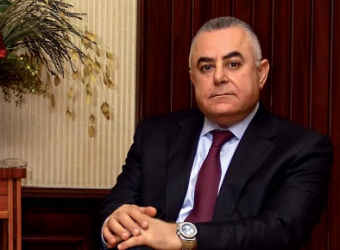Egypt’s Central Bank (CBE) kept its interest rates on hold as expected on Thursday, as the government strives to stimulate the economy while keeping inflation in check.
The economy has been badly damaged by political instability since the overthrow of former President Hosni Mubarak in 2011.
It grew 2.1 percent in the year to June 30, tepid for an emerging economy and far too slow to make an impact on youth unemployment, estimated at more than 20 percent, in the Arab world’s most populous state.
Inflation picked up to just over 10 percent in September after a dip to 9.7 percent in August.
“The pronounced downside risks to domestic GDP (gross domestic product) combined with the persistently negative output gap since 2011 will limit upside risks to the inflation outlook going forward,” the bank said in a statement.
“Given the mixed balance of risks surrounding the inflation and the GDP outlooks at this juncture, MPC (monetary policy committee) judges that the current key CBE (Central Bank of Egypt) rates are appropriate.”
The bank kept its deposit rate at 8.75 percent and its lending rate at 9.75 percent. It also kept its discount rate and the rate it uses to price one-week repurchase and deposit operations at 9.25 percent.
Eight out of nine economists in a Reuters survey had forecast the bank would leave its overnight rates unchanged. One expected a 50 basis point reduction.
At its previous monetary policy meeting, the central bank cut its key overnight interest rates by 50 basis points, saying it was stressing higher growth over lower inflation. It was the second half-point cut in a row since August.
The central bank is under pressure to keep interest rates high to attract funds out of foreign currencies and into the Egyptian pound. The bank has spent tens of billions of dollars supporting its currency since the 2011 uprising which hammered tourism revenues and foreign investment.
Egypt’s cabinet, appointed after the army removed Mubarak’s successor, Islamist President Mohamed Morsi, from power on July 3 following mass protests against him, has said it will spend 29.6 billion Egyptian pounds ($4.3 billion) on a stimulus package to try and revitalise the economy.
Gulf countries have pledged more than $12 billion in aid to Egypt since July.
Source: Reuters



